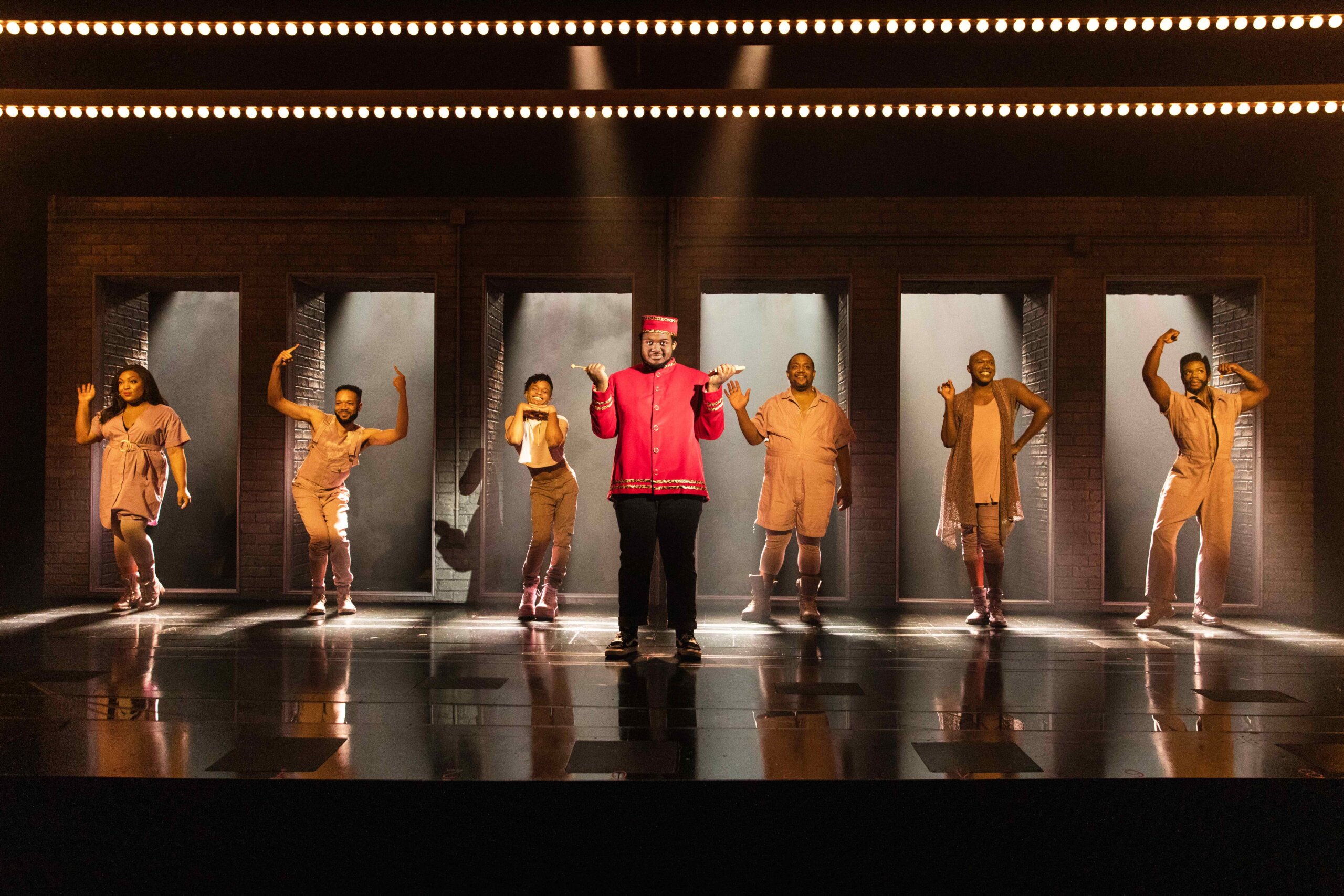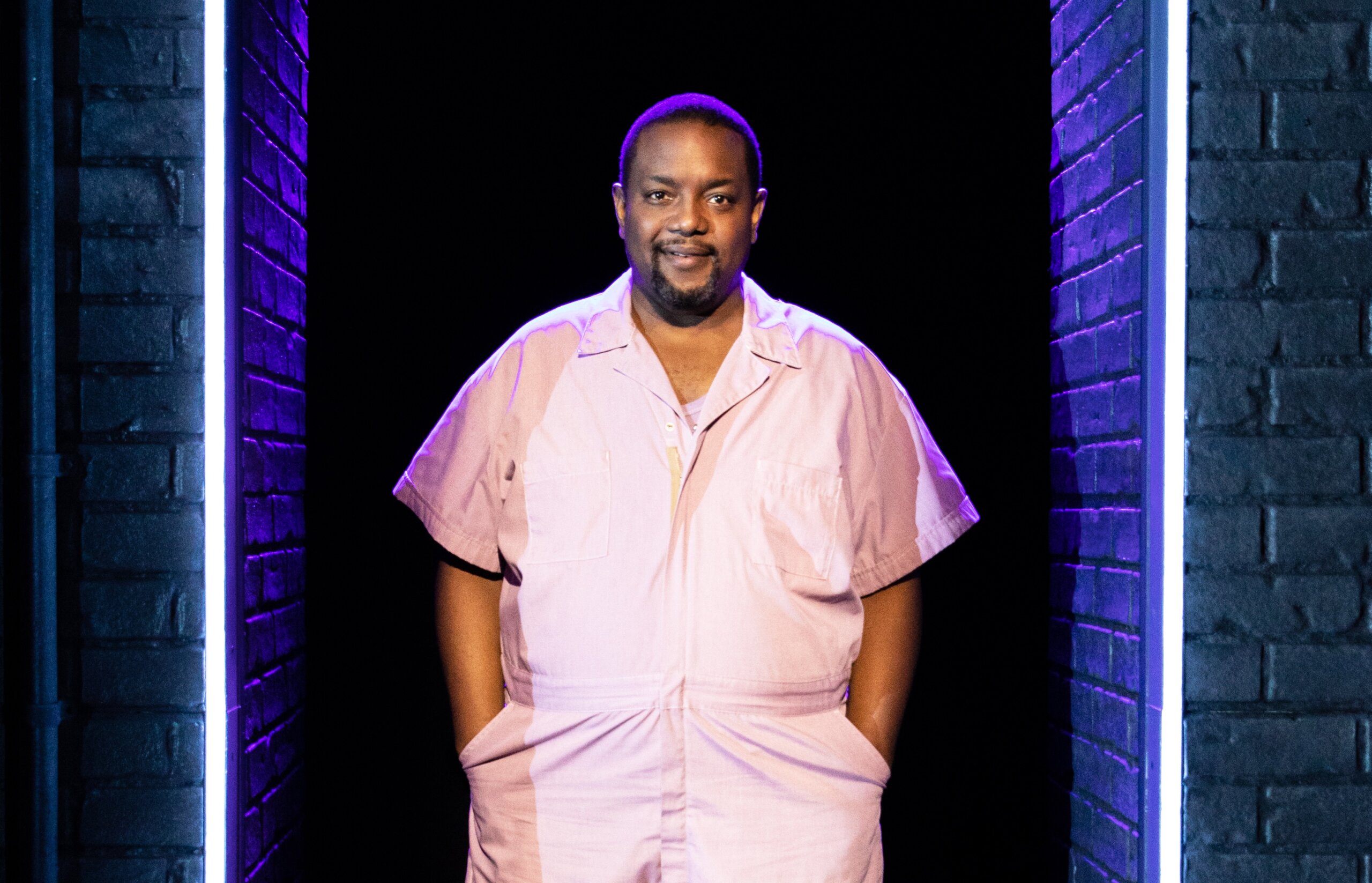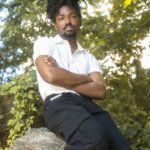Actor John-Andrew Morrison sees people. That’s clear when we meet in Manhattan in early October for lunch, essentially across the street from Broadway’s Lyceum Theatre, where he has been starring in the Tony Award-winning A Strange Loop through January 15, 2023. From his arrival at the restaurant, all the way through our meal and even as he exits, he speaks to the restaurant staff as if they’re family. At one point he asks our waiter how he’s doing.
“No one ever asks me that,” the young server replies. Sure it’s minimal, but there’s a level of care there. That same care was extended to me when my plate arrived and I seemed to make a face.
“What’s wrong?” Morrison asks. It’s nothing, I’m just prone to facial expressions.
A Strange Loop is the Michael R. Jackson musical that won a Pulitzer Prize in 2020 during its off-Broadway run. It opened at the Lyceum for its Broadway run in April and won Best Musical at this year’s Tony Awards. To call it lauded is an understatement. Morrison plays Thought 4, one of six thoughts that live in the head of the play’s lead character, Usher. Usher, an usher for the Broadway musical The Lion King, is an aspiring playwright trying to write a semi-autobiographical musical about an usher writing a musical. Thus, begins the loop.
The six thoughts—all played by Black queer and trans performers—manifest not only as Usher’s emotions like his daily self-loathing, but also the council of voices in his head hoping to steer him. They have thoughts—and songs—about his sex life as a fat Black gay man in New York City, as well as on his career and how far is too far when it comes to compromising. They also at times appear as the real-life people who make up the experiences that serve as the in-progress play’s inspiration.

Credit: Marc J. Franklin
Morrison, who was nominated for a Tony in the supporting actor category for his work, stuns throughout, but becomes pivotal in the last third of the production, transforming into the role of Usher’s Bible-thumping, church-gossiping, ever-doting mother—a woman who misses her son and hopes that he will eventually write a Tyler Perry-esque gospel play, as well as turn away from the “homosexualities” and toward God.
But even through her chuckle-inducing moments and her biblically backed homophobia, it’s a poignantly portrayed, nuanced role that allows audiences to see their own mothers, grandmothers and aunts. And that ultimately comes down to Morrison’s care, his ability to see the mother in her fullness.
“It starts with honouring her,” he tells me over lunch. “ I remember the first discussions we had to put her in a dress and immediately I thought: she’s not a joke. Yes, she says funny things and she might do things that are slightly funny, but she is not a joke, her life is not a joke. Once they put me in a dress, I doubled down on that.”
Born in Kingston, Jamaica, Morrison came to theatre early. Annual summer trips to Elmhurst, Queens, in New York City to stay with his Aunt Claudia exposed him to productions like Annie and The Wiz through two-for-one deals. Those experiences opened up a new world for the young child.
“Theatre was always this magical thing to me,” he recalls. “I remember as a kid when someone walked off stage left but came on stage right, I would wonder how they did that. I thought it was magic.” Back in Jamaica, he looked forward to the national pantomime performance every Christmas and his mother took him to see productions starring comedic actor Oliver Samuels and other local stars. High school brought an introduction to the Jamaica Musical Theatre Company, and after working as a part of the crew of one production, he decided to audition for the next. His father said no.
“I remember being devastated.” The night before the auditions, Morrison went into his dad’s bedroom at two in the morning and pled his case again. His exhausted father relented and the teen auditioned before going on to play the Wizard in that year’s production of The Wizard of Oz.
“I was this little not out gay boy in Kingston, Jamaica,” he explains. “[In theatre], I was in a space where I got to be weird. I didn’t have to be macho. I didn’t have to be this masculine guy. I was around a lot of women who put makeup on me. I got to be in a different environment. In macho-macho Jamaica, I felt like I could be myself or express something that I wasn’t allowed to express otherwise.”
Where he had previously sung to himself quietly in his bedroom closet, in the theatre his voice was celebrated. Where his mom and teacher had once made it clear that it was not acceptable for him to take dance class with the girls, he was applauded for his moves.
Morrison’s mother had been pivotal in his development. She had been the one to open his eyes to beauty and “made it okay to have an artist’s soul” in those early years. And while the exhibition of narrow-mindedness about dance seems incongruous with that, Morrison understands.
“It was protection,” he says of what his mom had done. “I can look at that now in hindsight and see that it’s protection, but receiving that as a young kid made me feel like I was wrong or strange or damaged somehow. But in this world of hypermasculine people, being soft was dangerous. In Jamaica, it’s very man, man tings. So I think she was cognizant and was trying to guide or lead the best way that she could me to be like the rest of the boys.”
Morrison’s experience with his own mother and other women in his life have left an indelible impression, shaping his portrayal of Thought 4, a part he’s played in some capacity since 2008 when he began singing “Periodically” as part of Jackson’s Dirty Laundry cabaret.
The song encapsulates Usher’s mother perfectly: she has called him and left a message in the hopes she will be the first to wish him a happy 26th birthday. In her slightly ribbing way, she reminds him that she loves him, that she will always be in his corner, and that he must read his Bible. But what starts as a light, smile-inducing jingle works its way into a frothy fire-and-brimstone sermon.
“All of these Hollywood homosexuals waving gay flags all day and night,” she yells. “Sticking their things in each other’s buttholes, I’m telling you, son, that it just ain’t right.” Before returning to stage to perform the song, Morrison transforms into the mother by simply donning a pink dress and pearls. (That the illusion is but an impressionistic gesture at a mother, he believes that the choice allows for audiences to complete the look, customizing it to their own experiences.) The character continues singing: “And I just need to call up my baby boy and remind him of that periodically. Cuz I love you and I don’t want your soul to be wasted, it hurts me so bad sometimes I can taste it. Hell is real.”
Despite the condemnation, this was a song about a mother’s loving protection. All of the character’s fussiness or ribbing or chiding all originated in love.
“If she loves you enough, she loves you enough to risk hurting your feelings,” Morrison says.
While on its face, A Strange Loop seems to be extremely specific, almost a singular experience of a big Black queer male body, it is through that specifity that it finds universality. As Morrison learned during the off-Broadway run of the production, for which he won a Lucille Lortel Award, the production not only gave new portrayals for Black people onstage, but allowed audiences writ large to gain greater perspectives on their own lives.
“Even though I know what we are doing is treacherous and pulling the rug out from under people, I know ultimately there’s healing in being able to see an experience that might be similar to yours and to realize that you’re not alone,” Morrison says. “I can’t tell you how many times I’ve come out and people have just cried and held me and said you helped me see or you gave me an opportunity to understand my mother in a different way.”
“And I tell them, ‘You’re welcome, and I’m sorry.’”


 Why you can trust Xtra
Why you can trust Xtra


